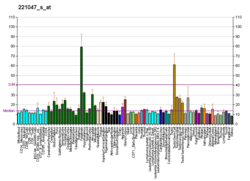MARK1
Appearance
Serine/threonine-protein kinase MARK1 is an enzyme that in humans is encoded by the MARK1 gene.[5][6]
References
[edit]- ^ a b c GRCh38: Ensembl release 89: ENSG00000116141 – Ensembl, May 2017
- ^ a b c GRCm38: Ensembl release 89: ENSMUSG00000026620 – Ensembl, May 2017
- ^ "Human PubMed Reference:". National Center for Biotechnology Information, U.S. National Library of Medicine.
- ^ "Mouse PubMed Reference:". National Center for Biotechnology Information, U.S. National Library of Medicine.
- ^ Drewes G, Ebneth A, Preuss U, Mandelkow EM, Mandelkow E (May 1997). "MARK, a novel family of protein kinases that phosphorylate microtubule-associated proteins and trigger microtubule disruption". Cell. 89 (2): 297–308. doi:10.1016/S0092-8674(00)80208-1. PMID 9108484. S2CID 15647848.
- ^ "Entrez Gene: MARK1 MAP/microtubule affinity-regulating kinase 1".
Further reading
[edit]- Drewes G, Trinczek B, Illenberger S, et al. (1995). "Microtubule-associated protein/microtubule affinity-regulating kinase (p110mark). A novel protein kinase that regulates tau-microtubule interactions and dynamic instability by phosphorylation at the Alzheimer-specific site serine 262". J. Biol. Chem. 270 (13): 7679–88. doi:10.1074/jbc.270.13.7679. PMID 7706316.
- Yang SD, Yu JS, Shiah SG, Huang JJ (1994). "Protein kinase FA/glycogen synthase kinase-3 alpha after heparin potentiation phosphorylates tau on sites abnormally phosphorylated in Alzheimer's disease brain". J. Neurochem. 63 (4): 1416–25. doi:10.1046/j.1471-4159.1994.63041416.x. PMID 7931292. S2CID 85176778.
- Illenberger S, Drewes G, Trinczek B, et al. (1996). "Phosphorylation of microtubule-associated proteins MAP2 and MAP4 by the protein kinase p110mark. Phosphorylation sites and regulation of microtubule dynamics". J. Biol. Chem. 271 (18): 10834–43. doi:10.1074/jbc.271.18.10834. PMID 8631898.
- Paudel HK (1997). "The regulatory Ser262 of microtubule-associated protein tau is phosphorylated by phosphorylase kinase". J. Biol. Chem. 272 (3): 1777–85. doi:10.1016/S0021-9258(19)67481-8. PMID 8999860.
- Sengupta A, Kabat J, Novak M, et al. (1998). "Phosphorylation of tau at both Thr 231 and Ser 262 is required for maximal inhibition of its binding to microtubules". Arch. Biochem. Biophys. 357 (2): 299–309. doi:10.1006/abbi.1998.0813. PMID 9735171.
- Wang JZ, Wu Q, Smith A, et al. (1998). "Tau is phosphorylated by GSK-3 at several sites found in Alzheimer disease and its biological activity markedly inhibited only after it is prephosphorylated by A-kinase". FEBS Lett. 436 (1): 28–34. doi:10.1016/S0014-5793(98)01090-4. PMID 9771888.
- Hanger DP, Betts JC, Loviny TL, et al. (1998). "New phosphorylation sites identified in hyperphosphorylated tau (paired helical filament-tau) from Alzheimer's disease brain using nanoelectrospray mass spectrometry". J. Neurochem. 71 (6): 2465–76. doi:10.1046/j.1471-4159.1998.71062465.x. PMID 9832145.
- Schneider A, Biernat J, von Bergen M, et al. (1999). "Phosphorylation that detaches tau protein from microtubules (Ser262, Ser214) also protects it against aggregation into Alzheimer paired helical filaments". Biochemistry. 38 (12): 3549–58. doi:10.1021/bi981874p. PMID 10090741.
- Reynolds CH, Betts JC, Blackstock WP, et al. (2000). "Phosphorylation sites on tau identified by nanoelectrospray mass spectrometry: differences in vitro between the mitogen-activated protein kinases ERK2, c-Jun N-terminal kinase and P38, and glycogen synthase kinase-3beta". J. Neurochem. 74 (4): 1587–95. doi:10.1046/j.1471-4159.2000.0741587.x. PMID 10737616.
- Nagase T, Kikuno R, Ishikawa K, et al. (2000). "Prediction of the coding sequences of unidentified human genes. XVII. The complete sequences of 100 new cDNA clones from brain which code for large proteins in vitro". DNA Res. 7 (2): 143–50. doi:10.1093/dnares/7.2.143. PMID 10819331.
- Liu F, Iqbal K, Grundke-Iqbal I, Gong CX (2002). "Involvement of aberrant glycosylation in phosphorylation of tau by cdk5 and GSK-3beta". FEBS Lett. 530 (1–3): 209–14. doi:10.1016/S0014-5793(02)03487-7. PMID 12387894.
- Liu F, Zaidi T, Iqbal K, et al. (2003). "Aberrant glycosylation modulates phosphorylation of tau by protein kinase A and dephosphorylation of tau by protein phosphatase 2A and 5". Neuroscience. 115 (3): 829–37. doi:10.1016/S0306-4522(02)00510-9. PMID 12435421. S2CID 26118803.
- Strausberg RL, Feingold EA, Grouse LH, et al. (2003). "Generation and initial analysis of more than 15,000 full-length human and mouse cDNA sequences". Proc. Natl. Acad. Sci. U.S.A. 99 (26): 16899–903. Bibcode:2002PNAS...9916899M. doi:10.1073/pnas.242603899. PMC 139241. PMID 12477932.
- Timm T, Li XY, Biernat J, et al. (2003). "MARKK, a Ste20-like kinase, activates the polarity-inducing kinase MARK/PAR-1". EMBO J. 22 (19): 5090–101. doi:10.1093/emboj/cdg447. PMC 204455. PMID 14517247.
- Trinczek B, Brajenovic M, Ebneth A, Drewes G (2004). "MARK4 is a novel microtubule-associated proteins/microtubule affinity-regulating kinase that binds to the cellular microtubule network and to centrosomes". J. Biol. Chem. 279 (7): 5915–23. doi:10.1074/jbc.M304528200. PMID 14594945.
- Ota T, Suzuki Y, Nishikawa T, et al. (2004). "Complete sequencing and characterization of 21,243 full-length human cDNAs". Nat. Genet. 36 (1): 40–5. doi:10.1038/ng1285. PMID 14702039.
- Lizcano JM, Göransson O, Toth R, et al. (2005). "LKB1 is a master kinase that activates 13 kinases of the AMPK subfamily, including MARK/PAR-1". EMBO J. 23 (4): 833–43. doi:10.1038/sj.emboj.7600110. PMC 381014. PMID 14976552.
- Gerhard DS, Wagner L, Feingold EA, et al. (2004). "The Status, Quality, and Expansion of the NIH Full-Length cDNA Project: The Mammalian Gene Collection (MGC)". Genome Res. 14 (10B): 2121–7. doi:10.1101/gr.2596504. PMC 528928. PMID 15489334.
- Benzinger A, Muster N, Koch HB, et al. (2005). "Targeted proteomic analysis of 14-3-3 sigma, a p53 effector commonly silenced in cancer". Mol. Cell. Proteomics. 4 (6): 785–95. doi:10.1074/mcp.M500021-MCP200. PMID 15778465.







